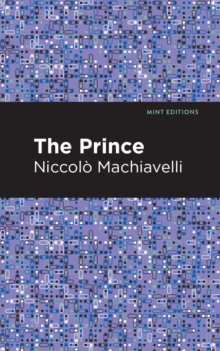Description
| Product ID: | 9781513269061 |
| Product Form: | Paperback / softback |
| Country of Manufacture: | GB |
| Series: | Mint Editions |
| Title: | The Prince |
| Authors: | Author: Niccolo Machiavelli |
| Page Count: | 120 |
| Subjects: | Medieval Western philosophy, Western philosophy: Medieval & Renaissance, c 500 to c 1600, Social and political philosophy, Social & political philosophy |
| Description: | With a mix of both respectable and immoral advice, The Prince is a frank analysis on political power. Separated into four sections, The Prince is both a guide to obtain power and an explanation on the aspects that affect it. The first section discusses the types of principalities. According to Machiavelli, there are four different types—hereditary, mixed, new and ecclesiastical. While defining each type, Machiavelli also discusses the implications of each. Next, The Prince identifies types of armies. There are hired armies, which Machiavelli himself expressed distrust of, loaned troops (also known as auxiliaries), native, or a mix of the three. With intriguing contrasts, the next section reveals the most effective behavior and characteristics for a ruler. While it is advised to be stingy over generous, cruel over merciful, and champions dishonesty over inconvenience, The Prince also stresses the importance of being a well-like ruler with an enhanced reputation, creating a complex character to portray. Finally, to highlight why the aforementioned sections are necessary and accurate, the last section of The Prince discusses the political state of 16th century Italy. With examples of both effective and ineffective policies and rulers, The Prince provides intriguing philosophical and political discourse as well as a detailed look at the innerworkings of the Italian government during the Renaissance. The Prince by Niccolò Machiavelli introduces an unprecedented political analysis, creating a fascinating discussion on Renaissance politics while inviting readers to consider the evidence of Machiavelli’s studies present in modern-day government. Machiavelli’s work has paved the way for and shaped political parties that are still in practice even in a democratic society, consequently solidifying The Prince as an ever-present analysis of political science. This edition of Niccolò Machiavelli’s The Prince is presented in a modern font and features a new, eye-catching cover design. Providing both a riveting look into Renaissance politics and a relevant analysis of power, The Prince by Machiavelli possess a duality that preserves its influence. With a mix of both respectable and immoral advice, The Prince is a frank analysis on political power. Separated into four sections, The Prince is both a guide to obtain power and an explanation on the aspects that affect it. The first section discusses the types of principalities. According to Machiavelli, there are four different types—hereditary, mixed, new and ecclesiastical. While defining each type, Machiavelli also discusses the implications of each. Next, The Prince identifies types of armies. There are hired armies, which Machiavelli himself expressed distrust of, loaned troops (also known as auxiliaries), native, or a mix of the three. With intriguing contrasts, the next section reveals the most effective behavior and characteristics for a ruler. While it is advised to be stingy over generous, cruel over merciful, and champions dishonesty over inconvenience, The Prince also stresses the importance of being a well-like ruler with an enhanced reputation, creating a complex character to portray. Finally, to highlight why the aforementioned sections are necessary and accurate, the last section of The Prince discusses the political state of 16th century Italy. With examples of both effective and ineffective policies and rulers, The Prince provides intriguing philosophical and political discourse as well as a detailed look at the innerworkings of the Italian government during the Renaissance. The Prince by Niccolò Machiavelli introduces an unprecedented political analysis, creating a fascinating discussion on Renaissance politics while inviting readers to consider the evidence of Machiavelli’s studies present in modern-day government. Machiavelli’s work has paved the way for and shaped political parties that are still in practice even in a democratic society, consequently solidifying The Prince as an ever-present analysis of political science. Since our inception in 2020, Mint Editions has kept sustainability and innovation at the forefront of our mission. Each and every Mint Edition title gets a fresh, professionally typeset manuscript and a dazzling new cover, all while maintaining the integrity of the original book. With thousands of titles in our collection, we aim to spotlight diverse public domain works to help them find modern audiences. Mint Editions celebrates a breadth of literary works, curated from both canonical and overlooked classics from writers around the globe. |
| Imprint Name: | Graphic Arts Books |
| Publisher Name: | Graphic Arts Books |
| Country of Publication: | GB |
| Publishing Date: | 2021-01-21 |


